The Magic Feather
by Grandmother Hilda
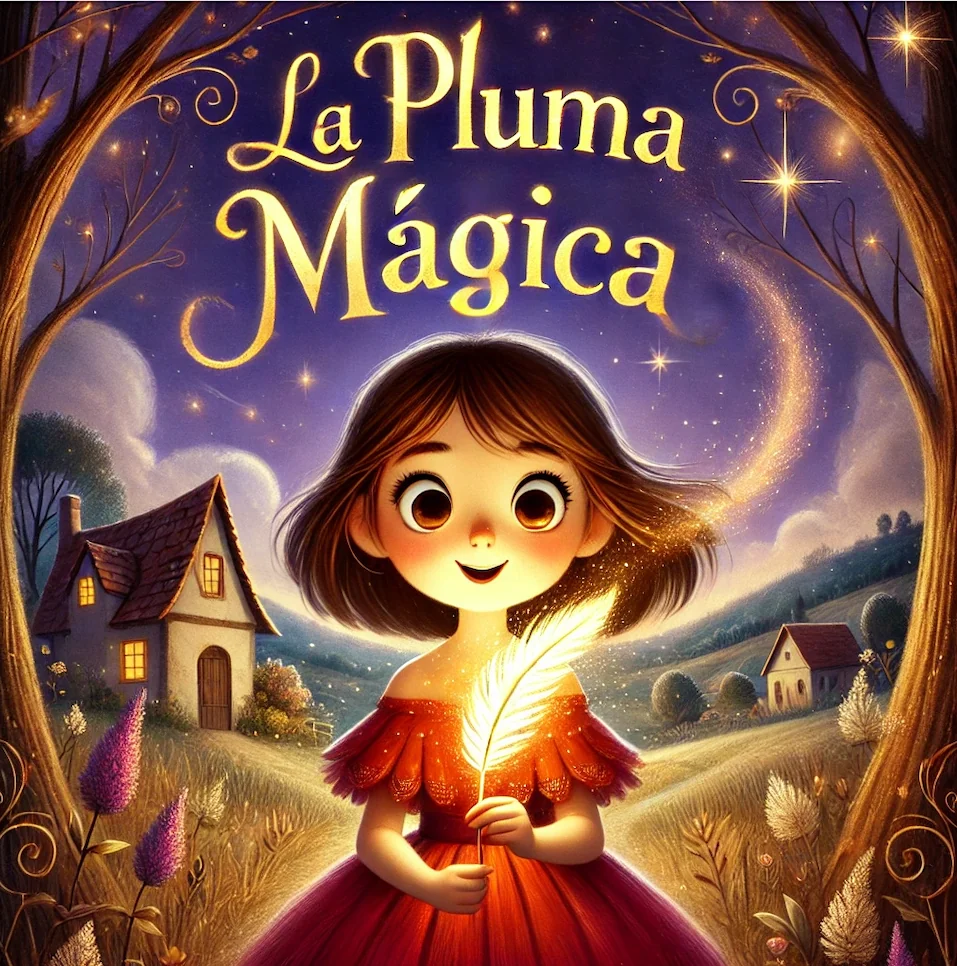
Prologue
Magic has always been a guiding thread in the stories we tell throughout our lives. Whether in tales we hear in childhood or stories we share as adults, magic has the power to transport us to worlds where anything is possible, where the ordinary becomes extraordinary with just a touch of fantasy. However, beyond spells and enchantments, true magic resides in the human heart, in our decisions, in small acts of kindness, and in the strength of imagination.
The Magic Feather is a story born from that conviction: that we all carry within us an immense power, a power that doesn’t depend on wands, spells, or extraordinary artifacts, but on our capacity to dream, to believe in ourselves, and to do good. Isabel, our young protagonist, lives in a humble environment, surrounded by the simplicity of the countryside, but inside her dwells a universe rich in imagination and desires to explore the unknown.
The appearance of a seemingly ordinary feather charged with mysterious power changes the course of Isabel’s life. What at first seems to be a blessing soon becomes a challenge that forces her to reflect on the true value of her actions. Through the pages of this tale, we accompany Isabel on a journey of self-discovery, where each decision she makes brings her closer not only to understanding the nature of the magic she has found, but also to discovering the strength of her own character.
This tale is a reminder that the simplest things can contain the greatest mysteries and that true magic, the kind that endures, is not found in objects, but in the choices we make and in the way we face our challenges. Isabel teaches us that the most powerful magic is the one we all carry within, waiting to be discovered and used for good.
A World of Imagination
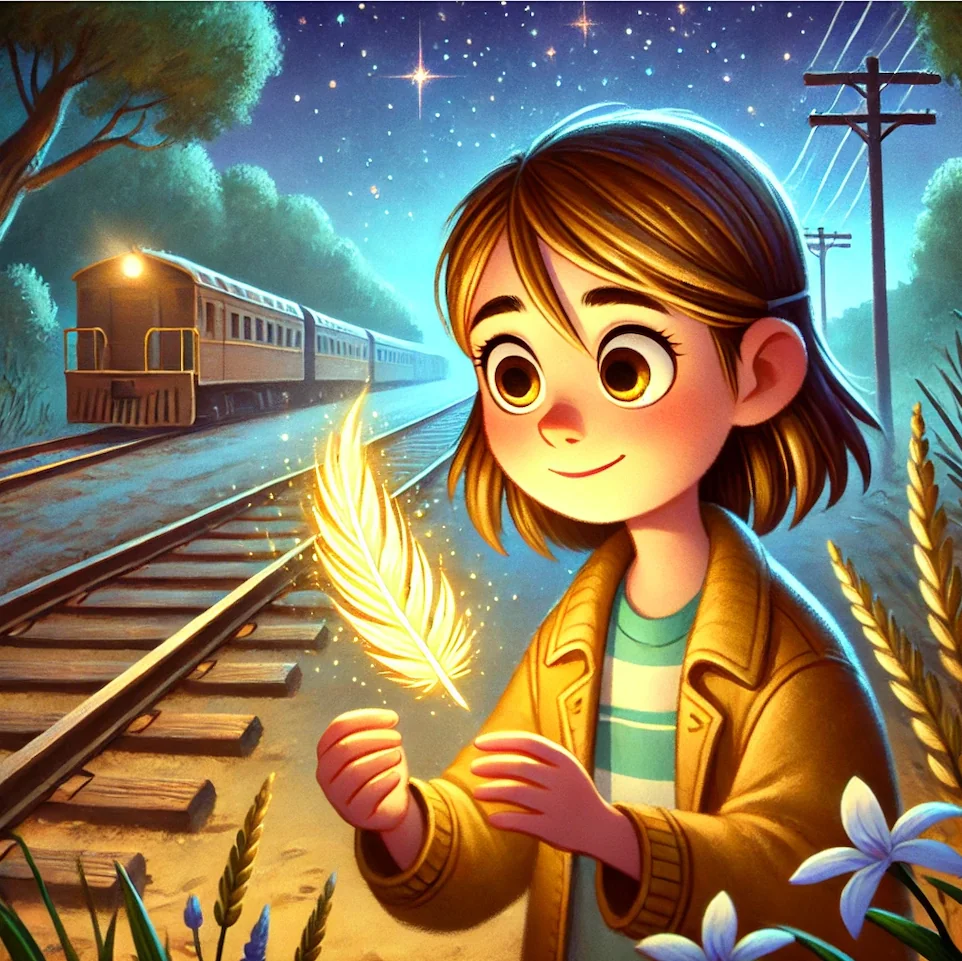
In a small valley surrounded by green mountains and crystalline rivers, there was a humble village where time seemed to stand still. Wooden houses, crowned with golden thatched roofs, were scattered along dirt roads that wound between fields of wildflowers and rolling hills. The air always smelled of damp earth and freshly baked bread coming from the chimneys every morning. In this corner of the world lived a girl named Isabel.
At nine years old, Isabel had brown hair that curled at the tips and honey-colored eyes that shone whenever she imagined a new story. She lived with her parents in a small wooden house painted sky blue, with a single window adorned by white curtains that her mother had embroidered with colored threads. The roof creaked softly when the wind blew, as if the house itself whispered secrets to her.
Her home was modest—barely two rooms and a kitchen with a wood stove—but it was full of love. Every morning, before dawn, Isabel heard her father get up and go out to the stable, humming the same song as always. There he milked Margarita, his only cow, a patient companion with brown fur and gentle eyes. Afterward, her father would take the fresh milk to the village to sell it, always returning with a smile and some curious story about the neighbors.
Her mother spent the afternoons knitting or mending clothes by the window, where the light was better. Sometimes she sang old songs that her own grandmother had taught her, and her voice filled the house with warmth.
From a very young age, Isabel showed an overflowing imagination. She spent hours in her favorite corner by the window, drawing and writing in her worn-cover notebook, creating fantastic worlds where anything was possible. Although shy with strangers, her brave spirit and determination drove her to explore new horizons in her mind. Her parents watched her tenderly, amazed at how their daughter could transform the ordinary into extraordinary with just a few words.
The Mystery of the Feather
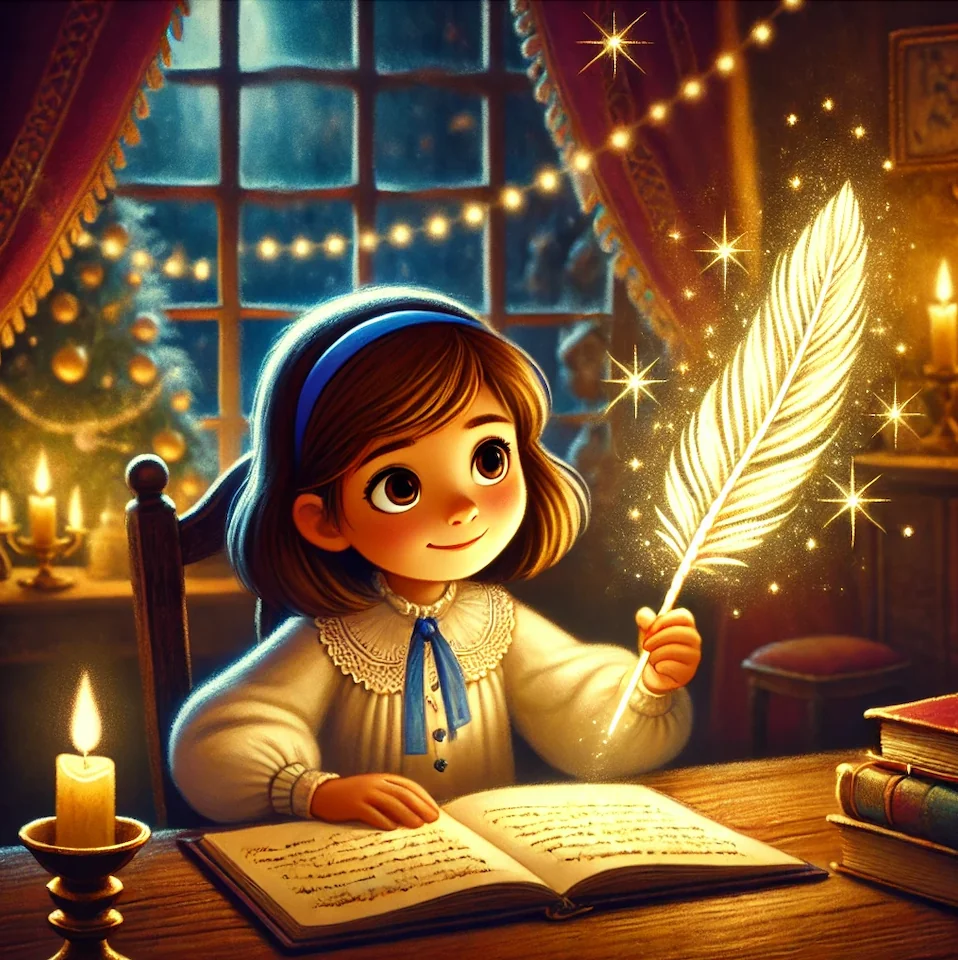
One autumn afternoon, while Isabel was walking near the train tracks where she usually looked for colored stones, something caught her attention. There, among the gray ballast stones, something silver was shining. As she approached, she discovered a feather that seemed to have fallen from the sky itself.
“How beautiful…” she whispered, picking it up carefully.
It wasn’t an ordinary feather. It had a soft glow that changed color depending on the light, reflecting iridescent tones of blue, violet, and gold. It was soft as silk to the touch, but firm as if it were made of something more than simple keratin. Isabel watched it spin between her fingers, fascinated by how it seemed to capture the evening light and transform it into rainbow sparkles.
“Where could you have come from?” she wondered, looking at the clear sky. There were no birds in sight, no similar feathers on the ground. Just this one, perfect and mysterious, as if it had been waiting for her.
With her heart pounding with excitement, Isabel tucked the feather into the pocket of her dress and ran home. She sat in her favorite spot by the window, where the afternoon light illuminated her worn-cover notebook. With hands trembling with anticipation, she dipped the tip of the feather in her small inkwell and wrote the first words: “A red rose.”
What happened next took her breath away.
The ink began to glow on the paper, giving off a soft golden radiance. The words seemed to come to life, pulsing with a strange energy. And then, before her incredulous eyes, a red rose appeared on her desk. It was real—she could smell its sweet perfume, feel the velvety softness of its petals, see the small drops of dew on its leaves.
“It can’t be!” she exclaimed, touching the flower with trembling fingers. It was solid, real, completely real.
Her heart was beating so hard she could hear it in her ears. Was she dreaming? She pinched her arm. No, she was completely awake. She took a deep breath, trying to calm her excitement, and decided to try again.
This time she wrote: “A small blue bird.” Again, the ink glowed, the words pulsed with life, and a tiny blue bird appeared on her windowsill. It chirped cheerfully, tilted its little head to look at her with eyes bright as black beads, and then took flight, disappearing among the evening clouds.
Isabel stood motionless, watching the sky where the bird had flown, feeling a mixture of wonder, excitement, and a slight shiver of unease. She held in her hands something extraordinary, something powerful. But what did this mean? What was she supposed to do with this gift?
Over the following days, Isabel experimented with the feather in secret. She created small flowers that she gave to her mother, who received them with smiles without suspecting their origin. She wrote about fresh fruits that appeared magically and that her family enjoyed at dinner. Each creation filled her with joy, but also with unanswered questions.
However, not everything she tried worked out well. One day she wrote about a cat and one appeared that scratched her mother’s embroidered curtains. Another time, she tried to create a large bouquet of flowers, but so many appeared that they flooded her room and she had to give them away throughout the village, making up excuses about a secret field she had found.
Little by little, Isabel began to realize that such great power also carried responsibility. Not everything she could create was useful or necessary. And there was something else that troubled her: every time she used the feather, she felt she was taking a shortcut, avoiding real effort.
A week later, the teacher assigned an important task: write an original story to share with the whole class. Isabel looked at her blank notebook and then at the golden feather on her desk. She knew that with the feather she could create the most perfect story anyone had ever read. She wouldn’t have to think, she wouldn’t have to make an effort, she wouldn’t have to erase and rewrite.
She would only have to let the feather do its job.
With a sigh that mixed relief and guilt, she took the feather and wrote: “A story about a brave prince.” The words flowed alone across the paper, forming perfect sentences, dazzling descriptions, brilliant dialogues. In just twenty minutes, she had a complete story that seemed to have been written by a professional author.
The Price of Magic
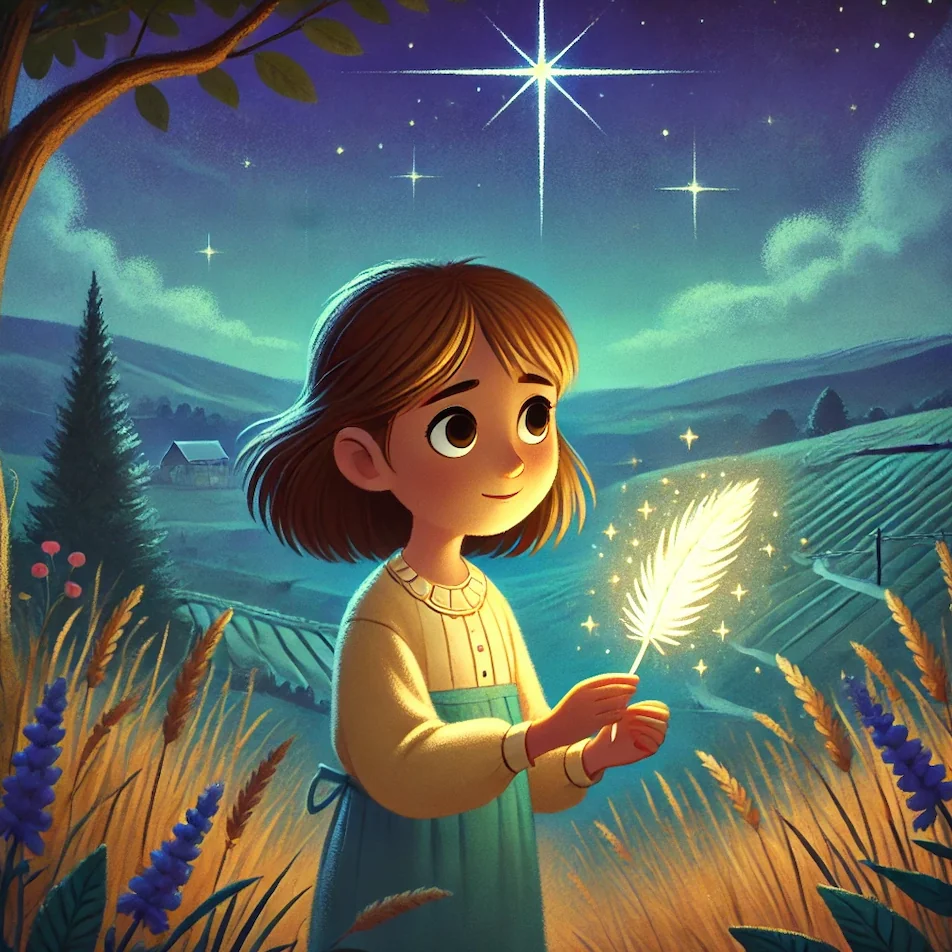
The next day, at school, Isabel sat at her desk with the notebook on her knees, feeling the weight of what she had done. The teacher, Miss Ramírez, an older woman with round glasses and a kind smile, asked the students to share their stories.
Several children read first. Pedro had written about a dog that got lost in the forest. Ana María narrated the story of a princess who learned to cook. They were simple stories, with some misspelled words and incomplete sentences, but made with heart.
Then it was Isabel’s turn.
As she read her story, she could feel everyone’s eyes on her. The words flowed perfectly, each plot twist was impeccable, each description painted vivid images. When she finished, silence filled the classroom.
“Isabel…” said the teacher, removing her glasses to clean them, something she did when she was deeply impressed. “This story is… extraordinary. Did you write it yourself?”
Isabel’s heart raced. “Yes, teacher.”
“It’s just that the words, the structure… it seems written by someone much older. Did you receive help from your parents?”
“No, teacher,” Isabel replied, feeling the heat rise to her cheeks. Technically it was true. Her parents hadn’t helped her. But she hadn’t really written it either.
Isabel’s classmates looked at her with a mixture of admiration and something that seemed like distance. Before they saw her as an equal; now, suddenly, there was an invisible barrier between them.
“You should submit it to a contest!” suggested the teacher enthusiastically. “This could be published in a magazine.”
Isabel nodded weakly, forcing a smile. Everyone congratulated her. Everyone praised her. But as she walked home that day, she didn’t feel joy. She felt a heavy emptiness in her chest, as if she had lost something important.
That night, Isabel lay awake looking at the feather on her desk. It glowed softly under the moonlight coming through her window. Beautiful. Powerful. Tempting.
And completely alien to her.
Days passed and the unease grew like a shadow in her heart. Every time someone praised her story, she shrank inside. Every time the teacher held her up as an example, she wanted to disappear. It wasn’t really her achievement. They weren’t really her words. It was all… false.
The feather continued to create wonderful things when she used it. But every time she wrote with it, she felt she was losing something more valuable: her own voice, her own effort, her own creativity. Ideas stopped coming to her on their own. Why bother thinking if the feather could do it for her?
One afternoon, two weeks after presenting the perfect story, the teacher assigned another task: write a poem about nature. Isabel opened her notebook, took her ordinary pencil—not the feather—and looked at the blank page.
Nothing.
She tried to think of beautiful words about the trees, the river, the mountains she saw every day. But her mind was empty, like a dry well. Frustrated, she put down the pencil and looked at the golden feather.
“Just this one more time,” she told herself. “Afterward I’ll write on my own.”
But she knew it was a lie.
That night, Isabel couldn’t sleep. She stared at the wooden ceiling of her room, listening to her father’s soft snoring in the adjoining room and the occasional creaking of the house settling. A question burned in her mind: Who was she without the feather? Could she still write her own stories, or had she forgotten how?
The next day, while everyone was out, Isabel made a decision. She sat by the window with her notebook, her ordinary pencil, and her determination. The feather stayed locked in a drawer, out of sight.
She began to write a story about a girl who lived in the mountains.
The first sentence was clumsy. The second, even worse. She crossed out, erased, started over. The words didn’t flow like when she used the feather. Each phrase required effort, each word had to be thought about, evaluated, chosen carefully. Her fingers got tired. Her head hurt from thinking so much.
After an hour, she had only written half a paragraph. And she didn’t even like how it sounded.
Tears threatened to well up. It was so difficult… much more difficult than she remembered. Had she lost her ability? Had she ever had it?
She almost gave up. She almost opened the drawer to take out the feather.
But then she remembered something her father had told her once, while working to repair the roof under the scorching sun: “Things that are worthwhile are never easy, my girl. But when you achieve them with your own hands, the pride you feel is priceless.”
Isabel took a deep breath. She dried her eyes. And tried again.
She wrote all afternoon. She crossed out, rewrote, searched for better words. Some sentences worked; others didn’t. But each word, clumsy or brilliant, was genuinely hers.
When the sun began to set and her mother called her for dinner, Isabel looked at what she had written. It was barely a page, with many cross-outs and corrections. It wasn’t perfect. The words didn’t shine with magic. The plot twists were simple.
But as she read what she had created, she felt something she hadn’t felt since finding the feather: true pride.
She smiled, wiping the last tears from her cheeks. It wasn’t a perfect story. But it was her story. Completely, absolutely hers.
And that made it more valuable than all the magic in the world.
A New Beginning
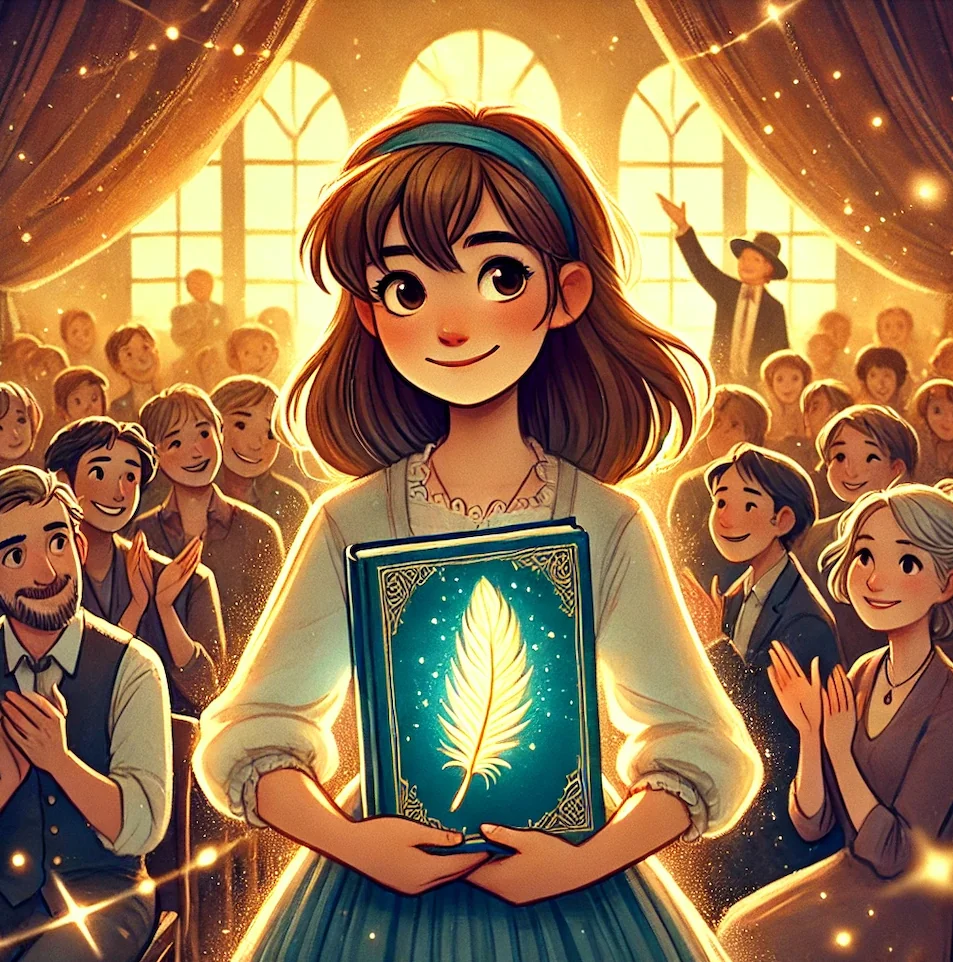
That night, after dinner, Isabel helped her mother wash the dishes while her father fed the fire in the stove. The aroma of vegetable soup still floated in the air. The house was bathed in the warm, golden light of the candles her mother had lit.
When they finished, the three sat around the small wooden table, the same one where Isabel had shared thousands of meals, where she had done homework, where she had listened to the stories her father told about his days in the village.
Isabel looked at her parents. Her mother, with her hair pulled back in a messy bun after a long day, still had that soft, attentive look. Her father, with hands calloused from so much work, held a steaming cup of tea. Both looked at her with love and patience.
“Mom, Dad… I need to tell you something,” Isabel began, her voice barely a whisper.
She took the golden feather from her pocket and placed it on the table. Under the candlelight, it shone with that mysterious radiance that had fascinated her from the beginning.
And then she told them everything. She told them about how she had found it, about the roses and the birds, about the flowers she had given her mother without telling her the truth. She told them about the perfect story she hadn’t really written, about the guilt that gnawed at her, about the emptiness she felt every time someone praised her. She told them about her struggle that afternoon, about the tears and effort, and about the pride she finally felt creating something truly hers.
When she finished, silence filled the room, broken only by the crackling of the fire.
Her mother was the first to speak. She reached out and took Isabel’s hand tenderly. “My girl… thank you for trusting us. I know it wasn’t easy to admit this.”
“I’m so ashamed,” Isabel whispered, feeling the tears return. “I lied. I cheated. And for a moment, I thought I was losing the ability to write on my own.”
Her father put down his cup of tea and leaned forward, looking at her with those kind eyes that always made her feel safe. “Isabel, do you remember when you tried to help me repair the roof last year?”
Isabel nodded, confused by the change of subject.
“You wanted to use my big hammer, the adult one, because you thought we’d finish faster. Do you remember what happened?”
“I couldn’t lift it properly,” Isabel replied. “And the nail bent.”
“Exactly. Not because you were weak or incapable, but because that tool wasn’t right for you at that moment. You needed your own hammer, smaller, that you could handle.” He pointed to his heart. “This feather is like that big hammer. It has power, yes, but it’s not your tool. It doesn’t help you grow; it does the work for you.”
“We’ve always known you have a special gift, Isabel,” her mother added, squeezing her hand. “Since you were little and drew stories on the floor with charcoal. Since you started telling us bedtime stories, completely invented by you. That gift didn’t come from any magic feather. It came from here.” She gently touched Isabel’s chest. “From your heart.”
“But the most important thing,” said her father, with a proud smile, “is that you’ve learned to trust yourself. That, my girl, is more valuable than all the magic in the universe.”
Isabel felt the tears roll down her cheeks, but this time they were tears of relief, of liberation. “I’m going to return it,” she announced with a firm voice. “Tomorrow. I’ll take it to the same place where I found it.”
Her parents nodded with approval.
“And you know what?” added her mother with a mysterious smile. “Those flowers you gave me… I kept them all. They’re dry now, but I kept them because they came from you. I don’t care if a magic feather created them. I care that you thought of me, that you wanted to make me happy. That’s what makes them special.”
Isabel hugged her parents, feeling their warmth, their unconditional love. In that moment, surrounded by her family in their small wooden house, she understood that true magic had been there all along: in her parents’ love, in her own heart, in the ability to dream and create with her own hands.
The next day, Isabel walked to the train tracks with the feather in her hand. The morning sun shone on the mountains, and the fresh air smelled of grass wet with dew. Her heart beat calmly, at peace with her decision.
But when she reached the exact spot where she had found the feather, she stopped.
One last temptation arose in her mind. She could keep it. She didn’t have to use it, but she could save it… just in case. What if someday she really needed it? What if she faced a problem that only magic could solve? What if…?
The feather seemed to shine more intensely in her hand, as if it were whispering promises of unlimited power.
Isabel closed her eyes. She remembered the feeling of emptiness when receiving praise for something she hadn’t created. She remembered the frustration of not being able to write without help. She remembered the genuine pride she felt finishing her own story, imperfect but authentic.
And she remembered her father’s words: “True magic is trusting yourself.”
She opened her eyes, took a deep breath, and placed the feather exactly where she had found it, among the gray ballast stones. For a moment, it seemed to pulse with light, as if saying goodbye. Then, its glow slowly faded until it became an ordinary feather.
Isabel smiled. She felt lighter, as if she had dropped an invisible weight she had been carrying. She turned around and walked back home, ready to write her own stories with her own words.
She didn’t need magic.
She was the magic.
From that day on, Isabel continued writing with her ordinary pencil and her worn-cover notebook. Her stories weren’t always perfect—sometimes words stumbled over each other, sometimes ideas needed polishing—but each story was genuinely hers. And that made them more valuable than any magical creation.
Over time, Isabel became a recognized writer in her village and beyond. But she never forgot the lessons she learned with the magic feather: that true power resides in one’s own effort, in authenticity, and in trusting the abilities we all carry within.
She lived surrounded by the love of her family, the respect of her community, and the deep satisfaction that comes from living with integrity. But more important than all that, she lived knowing that the most powerful force of all had been inside her from the beginning, patiently waiting to be discovered and cultivated.
She didn’t need enchantments.
She herself was the miracle.
The Power of True Magic

The years passed like leaves carried by the wind. Isabel continued her education with dedication and passion, excelling in everything she undertook. She got excellent grades, but what made her parents most proud weren’t the grades, but the person she was becoming: hardworking, honest, resilient.
Her love for words grew with each story she wrote. She filled notebook after notebook with tales about brave girls, talking animals, enchanted gardens, stars that guided the lost. Each story bore her personal stamp, her unique voice, that special spark that only she could offer.
At seventeen, while in her last year of high school, Isabel made an important decision. One spring afternoon, with the trees blooming outside her window, she spread out all the stories she had written since returning the feather. There were dozens of them, some scribbled on loose sheets, others carefully transcribed on clean pages.
With patience and dedication, she organized each story. She edited dialogues, polished descriptions, corrected errors she could now see with more experienced eyes. She added new ideas that had matured in her mind. After three months of constant work, the manuscript was complete: “Tales of the Valley,” a collection of twenty stories born from her heart.
“Mom, Dad,” she announced one evening during dinner, “I want to try to publish my stories.”
Her parents exchanged a look full of pride. Her father, now with more gray hair but the same warm smile, nodded enthusiastically. Her mother, taking her hand, said: “We always knew this day would come.”
Together, they made the long journey to the city. Isabel, with her manuscript carefully wrapped in cloth, visited several publishing houses. She faced rejections—some kind, others indifferent—but didn’t give up. At the fifth publishing house, an editor with silver hair and a perceptive gaze read her stories attentively.
“These stories have something special,” said the editor, looking at Isabel over her glasses. “They have authenticity. They have heart. Yes, we’re going to publish them.”
Isabel felt her heart could explode with joy.
Six months later, in a small village bookstore decorated with wildflowers and candles, the presentation of “Tales of the Valley” took place. The room was packed—neighbors, teachers, schoolmates, and many curious people who had heard about the young local writer.
Isabel, now seventeen and dressed in a simple blue dress that her mother had sewn especially for the occasion, stood before everyone with her book in her hands. Her fingers trembled slightly, but her voice came out clear and firm.
“This book,” she began, looking at the familiar and new faces, “is the result of years of effort, of smudges and cross-outs, of frustrations and joys. Each word you read was chosen carefully. Each story was written with the heart.” She paused, her eyes meeting her parents’ in the front row. “I learned that true power doesn’t come from shortcuts or easy solutions. It comes from believing in ourselves, from working hard, from being authentic. I hope that by reading these pages, you find inspiration to trust your own voice, your own talent, your own inner light.”
The applause was deafening. Her mother had tears in her eyes. Her father smiled with that silent but deep pride that only a father can feel.
“Tales of the Valley” became a modest but significant success. It wasn’t a national bestseller, but it touched hearts in her community and beyond. Village children asked Isabel to read to them at the library. Teachers used her stories in classrooms. Families shared the stories in the evenings before bed.
But the most important thing for Isabel wasn’t the sales or recognition. It was the feeling of authenticity, of knowing that each word was genuinely hers.
Sometimes, when she walked near the train tracks where she had found that feather years ago, Isabel smiled with nostalgia. The feather had been a teacher in disguise, teaching her one of the most valuable lessons of her life: that the true gift doesn’t reside in enchanted objects or external powers, but in the ability to dream, work with dedication, and believe in the abilities we all carry within.
And so, Isabel continued writing, story after story, year after year. Some tales were brilliant; others, imperfect. But all were authentically hers. And that, she discovered, was the most valuable thing of all.
She lived surrounded by the love of her family, the respect of her community, and the deep satisfaction that comes from living with integrity. But more important than all that, she lived knowing that the most powerful force of all had been inside her from the beginning, patiently waiting to be discovered and cultivated.
She didn’t need enchantments.
She herself was the miracle.
The Lesson: True magic doesn’t reside in enchanted objects, but in the power of our heart, in effort, creativity, and the decisions we make each day. We all carry within us an immense power waiting to be discovered.